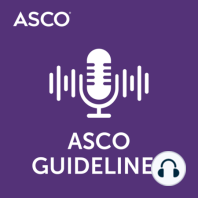27 min listen

Duration of Oxaliplatin-Containing Adjuvant Therapy for Stage III Colon Cancer Guideline
FromASCO Guidelines
Duration of Oxaliplatin-Containing Adjuvant Therapy for Stage III Colon Cancer Guideline
FromASCO Guidelines
ratings:
Length:
13 minutes
Released:
Apr 15, 2019
Format:
Podcast episode
Description
An intervew with Dr. Nancy Baxter on "Duration of Oxaliplatin-Containing Adjuvant Therapy for Stage III Colon Cancer: ASCO Clinical Practice Guideline." The guideline makes recommendations based on the results of the IDEA collaboration. Read the full guideline at www.asco.org/gastrointestinal-cancer-guidelines The purpose of this podcast is to educate and to inform. This is not a substitute for professional medical care and is not intended for use in the diagnosis or treatment of individual conditions. Guests on this podcast express their own opinions, experience, and conclusions. The mention of any product, service, organization, activity, or therapy should not be construed as an ASCO endorsement. Hello, and welcome to the ASCO Guidelines Podcast series. My name is Shannon McKernin. And today, I'm interviewing Dr. Nancy Baxter from St. Michael's Hospital in Toronto, senior author on "Duration of Oxaliplatin-Containing Adjuvant Therapy for Stage III Colon Cancer: ASCO Clinical Practice Guideline." Thank you for being here today, Dr. Baxter. Thanks very much, Shannon, for speaking with me. I'm happy to share our work developing this guideline. So first, can you give us a general overview of what this guideline covers and the studies which provide the evidence? Absolutely. So use of adjuvant therapy for patients with stage III colon cancer is common, and it's effective. We know that these patients are at substantial risk of recurrence of their disease and that adjuvant therapy can reduce that risk. But we also know that comes with a cost. The most effective adjuvant therapy is FOLFOX or oxaliplatin-containing chemotherapy regimens. And we know that a really substantial number of people will end up with neurotoxicity, with peripheral sensory neurotoxicity, that can be long lasting and certainly affects their quality of life. So the whole question was whether the duration of oxaliplatin-containing chemotherapeutic regimens could be shortened when they're used for adjuvant therapy, so if we could give three months instead of six months. Because we know that if we give three months of therapy, the risk of neurotoxicity is much lower. So if we had the same effectiveness with the shorter duration, then we could spare patients the negative consequences of the agent given for a longer period of time. So in developing these guidelines, we looked at the results of international group of trials, the six trials from the IDEA collaboration. So these were six randomized trials in various jurisdictions that tried to look at this question, so three months of an oxaliplatin-based chemotherapeutic regimen for adjuvant therapy for stage III cancer versus six months duration of therapy. And so there was a planned analysis to bring all of these data together to develop the evidence base to make this recommendation. So our guideline and our systematic review basically identified this is the key piece of literature to base our recommendations and guidelines on. That's essentially the main study, so the meta-analysis of these six randomized controlled trials that formed the basis of the IDEA collaboration. So the IDEA collaboration studies-- there were six individual randomized trials that formed part of the IDEA collaboration. And they were conducted in Italy, Greece, Japan, North America, through CALGB/SWOG, the UK, Denmark, Spain, Australia, Sweden, and New Zealand, as well as France. So data came from, really, around the world. The median age of people in the studies was 64 years of age. And these people had a really good performance status, so almost all of these patients had an ECOG performance status of 0 or 1. So they were healthy patients that were in the study. And so some patients received CAPOX, and some received FOLFOX. That wasn't part of the randomization scheme. Other than the CALGB/SWOG study, this was up to the discretion of the investigator or patient. In the SWOG/CALGB study, only FOLFOX was given. And the authors planned a pres
Released:
Apr 15, 2019
Format:
Podcast episode
Titles in the series (100)
Practical Assessment and Management of Vulnerabilities in Older Patients Guideline: An interview with Dr. Supriya Mohile from University of Rochester on the guideline published in JCO which provides guidance regarding the practical assessment and management of vulnerabilities in older patients undergoing chemotherapy. To read... by ASCO Guidelines